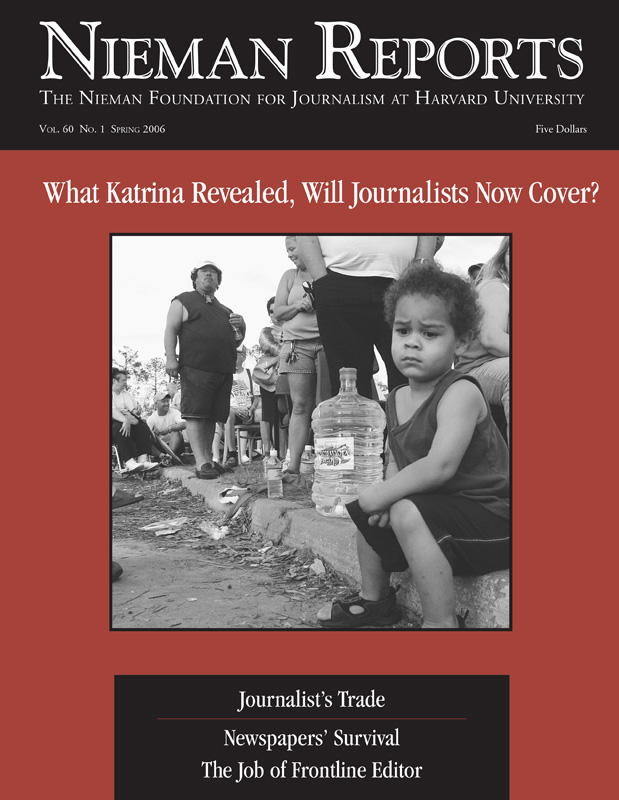Later this year frontline editors — prospective and current — will be able to browse an online course that introduces them to the job, helps them figure out whether they want to try it, and directs them to the training they need to be more effective at doing what’s required of them. The course, offered at Poynter Institute’s News University (NewsU), costs very little to take and is one of the first products of the Frontline Editors Project, a broad coalition of frontline editors, journalism educators, and corporate and newspaper training experts.
Knight project directors include NewsU’s Howard Finberg, NewsTrain’s Lillian Swanson and McLellan, who are joined by journalism educators Jacqui Banaszynski, Knight Chair in Editing at the University of Missouri; Michael Roberts, deputy managing editor of The Arizona Republic; John Greenman, journalism professor at the University of Georgia, and Carl Sessions Stepp, journalism professor at the University of Maryland.Launched in 2004, this project is an outgrowth of the John S. and James L. Knight Foundation’s $10 million Newsroom Training Initiative, which seeks to increase industry support for midcareer training of journalists. The Frontline Editors Project focuses on improving both the understanding of these editors’ roles and challenges and the midcareer training they receive. The job of the frontliner — the editor who has a direct hand in shaping news content and guiding newsgatherers — is among the fastest changing and most challenging in the newsroom. No longer just a conduit between the power centers of reporting and copyediting, the frontline editor must be a skilled craftsperson, manager, leader, administrator, topic specialist, coach and advocate for journalism and readers. Some of the industry’s innovators have found they could not drive change in their newsroom and their newspaper’s content without frontline editors leading the way.
Despite their importance and the tough transition when they switch from reporter or copyeditor, frontline editors often are sent to the end of the line for training. Generally, the focus at news organizations is on craft training for writers and visual journalists, with some leadership training available for top management. There is very little training going on in between. Now that’s changing. Tomorrow’s Workforce program, which I direct at Northwestern University, is working in 16 print newsrooms to improve their training and development programs. Newspapers, including the South Florida Sun-Sentinel and The Atlanta Journal-Constitution, and news corporations, including Cox, Lee, Knight Ridder, and Scripps, have developed programs for frontline editors.
- In 2003, Mike Phillips, editorial development director for E.W. Scripps Newspapers, created an intensive training program for newsroom managers. “I spent a lot of years in midlevel jobs,” Phillips explained to those directing Tomorrow’s Workforce. “You really do feel trapped between the suits and the working stiffs in some ways. And in today’s newsroom, which is far more complex than it was when I was city editor or an assistant city editor, you’re trapped in a lot of complex processes and very demanding serial deadlines. You’ve got to post to the Web site and on and on. We all had to feed the beast forever, but the beast has gotten to be more demanding.”
- At The Atlanta Journal-Constitution, senior editors decided the importance and changing nature of the frontline role required an intensive training program. “We started our training with assigning editors because they touch so many people in the newsroom. They are the bridge between reporters and top editors, the coordinators between the various newsroom departments, and the pipeline for so many newsroom messages,” said Shawn McIntosh, deputy managing editor in Atlanta. Since 2004, McIntosh and Managing Editor Hank Klibanoff have taught two-day sessions for more than 100 frontline editors.
- In addition to efforts by news organizations, the American Press Institute and the Poynter Institute initiated programs in 2005 and will launch more online courses for frontline editors at www.newsu.org.
- The Society of Metro Editors was formed to provide a professional forum to serve frontline local news editors.
The Frontline Editors Project seeks to link such existing resources and also to identify additional training and development needs. In addition to the online overview of the job, NewsU hopes to develop additional online training to supplement other training efforts. Working with a number of frontline editors and other journalists, the project is working to develop an inventory of skills and training needs that can help to shape a curriculum that will be presented to industry leaders in 2006.
Our goal is to help industry leaders and training providers take a fresh look at this ever-changing job — whether on the journalism or the business side of the organization. The case for training and staff development for frontline editors goes beyond their critical role in producing quality journalism. Their roles also touch on key factors that strengthen audience: employee satisfaction (high retention is also a money saver), newsroom culture (highly defensive editors resist change and innovation), and content improvements that can bolster and build credibility, relevance and engagement.
As any top editor knows, her goals are only as good as the people she asks to implement them. Look to the newsroom’s frontline and give these editors the training they need to do the job well.
Michele McLellan, a 2002 Nieman Fellow, directs Tomorrow’s Workforce, a training and development program at Northwestern University.


